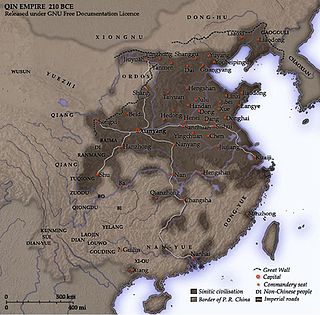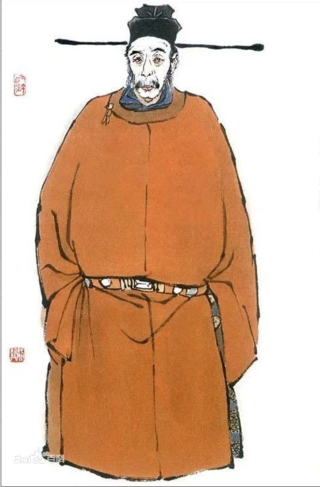
The Qin dynasty, or Ch'indynasty, was the first dynasty of Imperial China. Named for its heartland in Qin state, it arose as a fief of the Western Zhou and endured for over five centuries until 221 BC, when it evolved into an empire following its complete conquest of other rival states, which lasted only until 206 BC. It was established in 221 BC when Ying Zheng, who became the king of Qin state in 246 BC, declared himself the first emperor.

Qin Shi Huang was the founder of the Qin dynasty and the first emperor of a unified China. Rather than maintain the title of "king" borne by the previous Shang and Zhou rulers, he ruled China from 221 to 210 BC as the first "emperor" of the Qin dynasty. This title, which he invented for himself, would see continuous use by Chinese monarchs for the next two millennia.
Zhao Gao was a Chinese politician and calligrapher. He was an official of the Qin dynasty of China. Allegedly a eunuch, he served as a close aide to all three rulers of the Qin dynasty – Qin Shi Huang, Qin Er Shi and Ziying – and was regarded as having played an instrumental role in the downfall of the dynasty.
Qin Er Shi was the second emperor of the Qin dynasty from 210 to 207 BCE. The son of Qin Shi Huang, he was born as Ying Huhai. He was put on the throne by Li Si and Zhao Gao, circumventing Fusu, Ying's brother and the designated heir. Upon Ying's ascension, both Fusu and the popular general Meng Tian were killed on the orders of Li and Zhao, with Qin Er Shi's role in the assassinations remaining uncertain and controversial. A weak ruler, Qin Er Shi's reign was completely dominated by Zhao Gao, who eventually forced him to commit suicide. By the time of his death, the Qin Empire's power had lessened so much that his successor Ziying ruled as a king, not emperor.
Feizi, also known by the title Qin Ying, was the founder of the ancient Chinese state of Qin, predecessor of the Qin Dynasty that would conquer all other Chinese states and unite China in 221 BC.
Li Si was a Chinese calligrapher, philosopher, and politician of the Qin dynasty. He served as Chancellor from 246 to 208 BC under two rulers: Qin Shi Huang, the king of the Qin state and later the First Emperor of the Qin dynasty; and Qin Er Shi, Qin Shi Huang's eighteenth son and the Second Emperor. Concerning administrative methods, Li Si "indicated that he admired and utilized the ideas of Shen Buhai", repeatedly referring to the technique of Shen Buhai and Han Fei, but regarding law followed Shang Yang.
Ziying, King of Qin was the third and last ruler of the Qin dynasty. He ruled over a fragmented Qin Empire for 46 days, from mid-October to early December 207 BC. He is referred to in some sources with the posthumous name Emperor Shang of Qin (秦殤帝) although Qin abolished the practice of posthumous names.
Zhang Han was a Chinese military general of the Qin dynasty. When uprisings erupted throughout China during the reign of Qin Er Shi, Zhang Han led the Qin armies and successfully quelled several of these rebel forces. In 207 BC, Zhang Han was defeated by Xiang Yu of Chu at the Battle of Julu, after which he surrendered along with his 200,000 troops. He was conferred the title "King of Yong" (雍王) by Xiang Yu and given part of the lands in Guanzhong as his fief when Xiang split the former Qin Empire into the Eighteen Kingdoms after the fall of the Qin dynasty. Zhang Han's territory was conquered by Liu Bang in 206 BC, and he committed suicide a year later.

Lü Buwei was a Chinese merchant and politician of the Qin state during the Warring States period. Originally an influential merchant from the Wey (衛) state, Lü Buwei met and befriended King Zhuangxiang of Qin, who was then a minor prince serving as a hostage in the Zhao state. Through bribes and machinations, Lü Buwei succeeded in helping King Zhuangxiang become the heir apparent to the Qin throne. In 249 BCE, after King Zhuangxiang ascended the throne following the death of his father, King Xiaowen, he appointed Lü Buwei as his chancellor (相國) and ennobled him as "Marquis Wenxin" (文信侯). After King Zhuangxiang's death in 247 BCE, Lü Buwei became the chancellor and regent to King Zhuangxiang's young son, Ying Zheng, who later became Qin Shi Huang.

Sima Shi, courtesy name Ziyuan, was a military general and regent of Cao Wei during the Three Kingdoms period of China. In 249, he assisted his father Sima Yi in overthrowing the emperor Cao Fang's regent Cao Shuang, allowing the Sima family to become paramount authority in the state, and he inherited his father's authority after his father's death in 251. He maintained a tight grip on the political scene and, when the emperor, Cao Fang, considered action against him in 254, had him deposed and replaced with his cousin, Cao Mao. This tight grip eventually allowed him to, at the time of his death in 255 after just having quelled a rebellion, transition his power to his younger brother, Sima Zhao, whose son Sima Yan eventually usurped the throne and established the Jin dynasty.

The Myth is a 2005 Hong Kong—Chinese martial arts fantasy-adventure film directed by Stanley Tong, starring Jackie Chan, Tony Leung Ka-fai, Kim Hee-sun, and Mallika Sherawat.

The burning of books and burying of scholars, also known as burning the books and executing the ru scholars, refers to the purported burning of texts in 213 BCE and live burial of 460 Confucian scholars in 212 BCE by the Chinese emperor Qin Shi Huang of the Qin dynasty. This was alleged to have destroyed philosophical treatises of the Hundred Schools of Thought, with the goal of strengthening the official Qin governing philosophy of Legalism.

Gao Qiu (1076?–1126) was a Chinese politician who lived during the Song dynasty and served in the court of Emperor Huizong. In the classical novel Water Margin, he is fictionalised as one of the primary antagonists and a nemesis of the protagonists, the 108 Heroes of Mount Liang.
Murong Ping was a regent of the Xianbei-led Former Yan dynasty of China during the reign of Murong Wei, after the death of the previous, far more capable regent Murong Ke. He, along with Murong Wei's mother Empress Dowager Kezuhun, is often blamed for the Former Yan's decline and fall.
Wen Chu, courtesy name Ciqian, better known as Wen Yang, was a military officer of the Jin dynasty of China. He previously served in the state of Cao Wei during the Three Kingdoms period. In 255, he participated in a rebellion in Shouchun started by his father, Wen Qin, and another Wei general, Guanqiu Jian. However, the rebellion was suppressed and Wen Qin and his family were forced to defect to Eastern Wu, Wei's rival state. In 257, when another rebellion broke out in Shouchun, Wen Qin and his sons led troops from Wu to support the rebel leader, Zhuge Dan. However, by 258, when the odds were against him, Zhuge Dan became increasingly suspicious of Wen Qin and eventually executed him. Wen Yang and his younger brother, Wen Hu (文虎), escaped from Shouchun and surrendered to the Wei regent, Sima Zhao, and assisted him in suppressing the revolt. Wen Yang continued serving under the Jin dynasty, which replaced the Wei regime in February 266, and achieved fame for leading a successful military campaign against Xianbei forces in northern China. In April 291, he was falsely accused of plotting a rebellion with Yang Jun, an ousted regent, and was arrested and executed along with his family.

Prince of Qin is a 2002 action role-playing game developed by Object Software and published by Strategy First. The story is set in China in the final years of the Qin dynasty, with Fusu – the heir apparent to the first Qin emperor, Qin Shi Huang – as the protagonist. Although the game has a historical basis, its setting is purely fictitious because the historical Fusu died in 210 BC.

Qin Hui or Qin Kuai was a Chinese politician. He was a Chancellor of the Song dynasty in Chinese history.

Anna Russo is an Italian writer. She was born in Naples, and her debut as a writer partly came about after she received a major literary prize for travel writing: The Next Generation. As a result of the grant she lived for twelve years in southern France where she became close to the gypsies, particularly two of the "grand" families of Reyes and Baliardo. From this research and collaboration, she wrote two important books, Gitani si nasce e si diventa and El Cante Flamenco, which received support from the Spanish Consulate in Italy and by the Cervantes Cultural Institute.
The Three Rebellions in Shouchun were a series of revolts that occurred in the state of Cao Wei during the Three Kingdoms period. The rebellions broke out in the later years of Wei when the Sima clan, headed by Sima Yi, usurped state power. The military governors of Shouchun rose in revolt thrice in the name of a rebellion to oust the Sima clan from power. The respective leaders of the three rebellions were Wang Ling, Guanqiu Jian and Wen Qin, and Zhuge Dan. All the revolts were eventually suppressed.
Jian, King of Qi was the last king of Qi, one of the seven major states of the Warring States period of ancient China. His personal name was Tian Jian (田建), ancestral name Gui, and he did not have a posthumous title because he was the last king of Qi.










